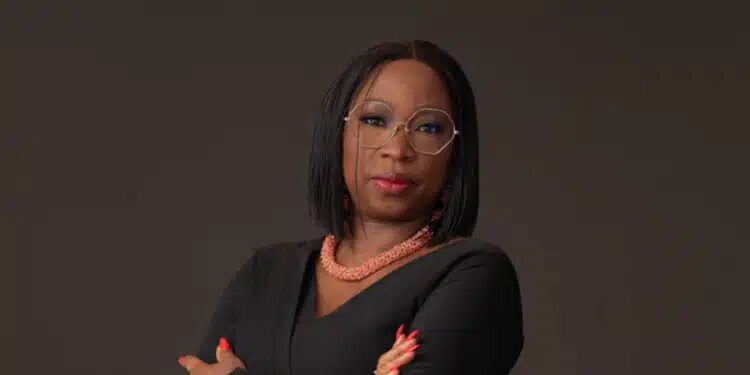As part of our International Women’s Day (IWD) series, PREMIUM TIMES spoke with Folashade Femi-Lawal, the country manager and area business head for Mastercard West Africa, about her journey, leadership philosophy, and how she continues to champion gender inclusion across sectors.
PT: Can you tell us about your professional journey and how you became a CEO?
Mrs Femi-Lawal: “No one makes it to the top; they are helped to the top based on the quality of their network.”
My journey is a testament to this truth. Talent, hard work, and resilience are essential, but the right career support — those who challenge, and open doors—make all the difference.
I made the bold leap from accounting to business development in the digital world at 42, with two young children.
At a time when many might have expected me to settle into a stable role, I was instead navigating an unfamiliar landscape.
The transition was anything but easy. I juggled motherhood, career shifts, and burned the proverbial midnight oil to ensure my voice carried weight in the rooms that mattered.
But I wasn’t alone. My husband played a pivotal role, not just encouraging me but actively investing in my growth— buying me books on digitalisation when it was still emerging in Nigeria.
My mentors and colleagues shared insights, made introductions, and trusted me with opportunities that shaped my career. As the head of FirstBank’s Digital Banking Group, I led groundbreaking innovations, including launching digital payments for rural workers, driving financial inclusion, and creating award-winning mobile banking solutions.
Now, I’m embracing yet another exciting chapter— transitioning from a 15-year career in banking to leading a global fintech, overseeing operations across five African countries.
Every step of this journey has reinforced that success isn’t achieved in isolation. What I did not get in promotions during my banking career, I enjoyed in abundance in visibility opportunities and garnered a rich network base, one of which recommended me for this CEO role.
The right network—people who invest in you, believe in you, and challenge you—can propel you to heights you never imagined. I continue to pay it forward, mentoring and supporting others, because I know that when we lift one another, we all rise.
In the words of Andrea Mohamed, “When we refuse to wield our power for positive change, we quietly protect rather than provoke the status quo”.
Unconsciously perpetuating the very systems designed to hold us back and trust me, I see you. I see you navigating the maze I know too well.
The higher you climb, the more precarious it is. The target on your back grows with each promotion. The cost of speaking up seems to compound with compound interest.
But remember this, If you’ve survived the cheese grater of bias to reach the executive ranks, you’ve earned something precious. Power. Real institutional power.
PT: In your opinion, how do women leaders inspire and empower others around them, especially other women?
Mrs Femi-Lawal: Women leaders inspire and empower others by leading with courage, breaking barriers, and proving that success knows no gender. Through mentorship, they share their wisdom, experiences, and networks, guiding other women toward growth and confidence.
They create opportunities—whether by hiring, promoting, or collaborating—ensuring that more women have a place at the table.
By challenging stereotypes and amplifying the voices of other women, they foster a culture of inclusion where diverse perspectives are valued.
They invest in education, advocate for policies that uplift women, and build supportive networks that strengthen the community.
Most importantly, they lead by example—demonstrating resilience, determination, and integrity—proving that when one woman rises, she lifts others with her. Their leadership creates a ripple effect, paving the way for future generations to thrive.
PT: What do you think is unique about women in leadership roles compared to men?
Mrs Femi-Lawal: Women in leadership bring a unique and powerful approach that transforms organisations and communities.
Their collaborative and inclusive leadership fosters teamwork, ensuring that every voice is heard and valued. With exceptional emotional intelligence and empathy, they build strong relationships, resolve conflicts effectively, and create a culture of trust.
Their communication style is transparent and engaging, encouraging open dialogue and meaningful connections.
Women leaders approach decision-making holistically, considering long-term impacts and diverse perspectives, while also championing work-life balance to enhance overall well-being.
They prioritise empowering others, mentoring and uplifting those around them.
By embracing authenticity and vulnerability, they cultivate psychological safety, making space for innovation and growth.
Their commitment to diversity, equity, and inclusion drives meaningful change, and their resilience in the face of challenges allows them to navigate complex situations with grace.
With their unique life experiences and perspectives, women enrich leadership, proving that strength lies not just in authority, but in collaboration, adaptability, and purpose-driven leadership.
PT: What challenges did you face as a woman in your industry, and how did you overcome them?
Mrs Femi-Lawal: Women aren’t often given the environment to thrive. We often deal with being overlooked in the guise of incompetency, incapability or lack of opportunity.
We get dismissed in the guise of feedback. We are undermined or face resistance just because “How dare we?”
Let’s not forget the common belief that we couldn’t possibly be where we are by our own hard work. I’ve heard it all.
Remaining focused and proving naysayers while being steadfast and grounded in my spirituality have been the ways forward.
My support system consisting of family members, friends and community has been integral. Remember that you are as strong as your network, and women having a rock-solid support system is priceless.
Once you set your mind to it and your intentions are pure, you can and will achieve anything. Most importantly, a woman’s God is her weapon, this is my most potent anchor and I use it well.
PT: Can you share one of the most rewarding moments in your career that solidified your passion for leadership?
Mrs Femi-Lawal: Knowing that leaders are accountable for their teams has been an integral aspect of my authentic leadership journey. There’s a saying that goes, “People don’t leave organisations, they leave managers,” and that has always resonated with me.
It means that I can impact how long someone stays in an organisation based on my management skills. My mantra is people don’t care how much you know until they know how much you care. We live in a world characterised by backstabbing, and many people have pull-down syndrome (PHD).
I believe that always leading from the heart wins. I have been lucky to have great leaders as managers throughout my career who have exemplified this and shown me the importance of practicing such while leading by example. The type of leaders that watch your back and have their word as their bond, which is something I’ve really benefited from.
PT: What advice would you give to young Nigerian women aspiring to become leaders in their fields?
Mrs Femi-Lawal: You must be deliberate, intentional, resilient and audacious.
Dear Woman, please know the game and play it well. The system you found your career isn’t broken it was designed this way; it just wasn’t designed with you in mind.
For far too long, women have struggled for relevance. I always tell women that if they don’t give you a seat at the table, go create your own table with like-minded women and work hard, then come back to buy the entire building. When you buy the entire building, you call the shots.
You must work hard and add value. It’s not just about looking good and being part of the latest fad. Look good and combine that with a good head on your shoulders.
Women often get overlooked, but you should always maintain your worth and strive to be an authentic leader. Be yourself, everyone else is taken. Set your goals, set your intentions, put in the work, and surround yourself with the right support system, and you won’t go wrong.
PT: How do you balance the demands of being a CEO with other aspects of your personal life?
Mrs Femi-Lawal: If it is important to you, you’ll make room for it, but there are a lot of sacrifices that must be made. I am hoping to be able to have longer hours of sleep, even as someone who is known to be a bundle of energy.
I am very passionate about customer service, and this has been very evident in the culture of who I am since my stint at the bank. Nearly 30 years of my career have been woven around the customer, whether in banking, advisory, or telecoms.
My passion for customer service led me to start Praying Mums, a global platform of 5400 members. Now, I’m the Chair of SheFintech, an association dedicated to Female fintech tech executives to pay it forward. Being a member of WIMBIZ since the 1st Annual Conference as an upcoming accountant helped me find my footing in the corporate world.
I’ve volunteered as a mentor for over ten years to support the organisation and its members. I’m also on the board of the Arise and Shine charity foundation. I may not be home 24/7, but I put a structure in place that works, and I make sure that I have domestic staff that can provide additional support even when I’m away from home.
PT: This year’s International Women’s Day theme is “Accelerate Action.” What does this theme mean to you and how does it reflect your leadership approach?
Mrs Femi-Lawal: Let’s stop paying lip service to giving women a voice. It’s 30 years post-Beijing Conference, and it’s time to take account. Is it really a man’s world? Women are leading in sectors like agriculture, food and drink and education.
They are at the forefront of AI adoption- 80 per cent of female entrepreneurs use AI to enhance efficiency and decision-making.
In Nigeria, 83 per cent of women currently consider themselves business owners, a figure far exceeding the regional average, according to Mastercard’s latest research released ahead of International Women’s Day.
Access to funding is at 57 per cent, with access to financial resources at 56 per cent. Numbers don’t lie, and it’s clear that work needs to be done.
Being a CEO at Mastercard, West Africa means that I get to be a part of an initiative where we are working with partners to address these barriers to ensure that women have the financial tools, digital resources and business networks to thrive in an ever-evolving economy.
This interview was conducted in partnership with Women in Management, Business, and Public Service (WIMBIZ), a Nigerian non-profit organisation committed to advancing and empowering women in leadership. Mrs Femi-Lawal is also a member of WIMBIZ.
Support PREMIUM TIMES’ journalism of integrity and credibility
At Premium Times, we firmly believe in the importance of high-quality journalism. Recognizing that not everyone can afford costly news subscriptions, we are dedicated to delivering meticulously researched, fact-checked news that remains freely accessible to all.
Whether you turn to Premium Times for daily updates, in-depth investigations into pressing national issues, or entertaining trending stories, we value your readership.
It’s essential to acknowledge that news production incurs expenses, and we take pride in never placing our stories behind a prohibitive paywall.
Would you consider supporting us with a modest contribution on a monthly basis to help maintain our commitment to free, accessible news?
TEXT AD: Call Willie – +2348098788999




